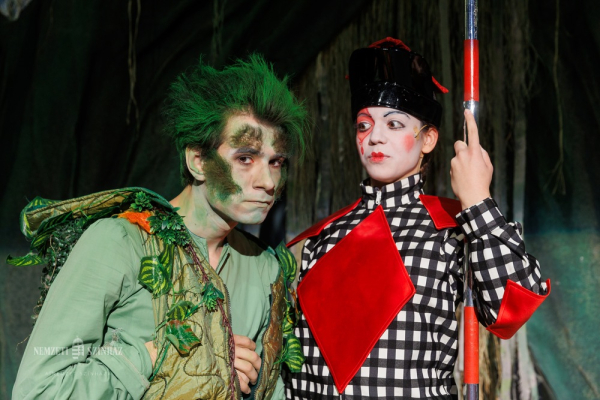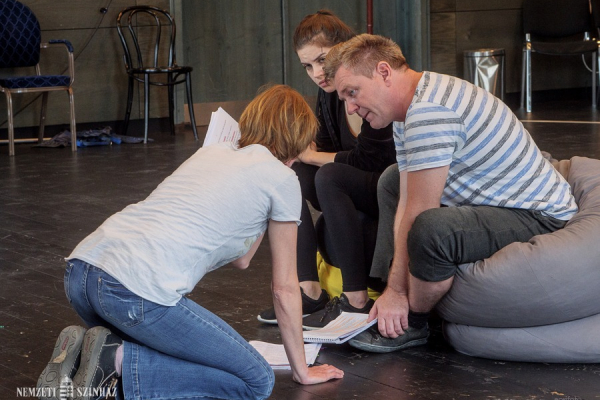
OLEANDER AND FLAX BLOSSOM 6
The National Theater offers a theatre experience to children from the age of six. Paradise on Earth is the entry-level show for the youngest, and the older ones have a repertoire geared to their literature curricula: John the Valiant, The Stars of Eger, Csongor and Tünde; secondary school students can enjoy A Midsummer Night's Dream and The Viceroy Bánk. For the youngest, next season we recommend the fairy tale Oleander and Flax Blossom, widely referred to as the most beautiful Hungarian fairy tale written since Csongor and Tünde. Ernő Szép Award winner Andor Szilágyi was inspired by Elek Benedek’s Collection of fairy tales Wonder Tree, but his romantic tale also incorporates the motifs of many famous predecessors: Beauty and the Beast, Wild Swans, and even includes references Shakespeare's works, such as A Midsummer Night’s Dream.
Since its original premiere in 1993, this fairy tale has mostly been played in regional theatres, but recently, it was staged at the Opera House as an opera tale. Andor Szilágyi commented on a theatre premiere of Oleander and Flax Blossom:
“I wanted to write a classical fairy tale that is instructive in every way. It has a hero we can relate to, an antagonist "loathed by the public", and a number of main and supporting characters showing human qualities that can be acquired and lost.
For the youngest age group, it is also necessary to explain the speaking names of the characters and the archaic words they use, such as the old equivalents of leech, sugar, king, cunning and spell. As a child, it was my dad who explained those words to me, to make sure I did not miss out on important details. He also taught me to try and find the solutions myself. Now, the point is not the message the author may have wanted to convey through the story of Oleander and Flax Blossom, but whether we can discover the story’s parallels with our own life, and that’s about more than the timeless fairy tale situation in which the good guy gets rewarded, and the bad guy is duly punished.... ”
King Bittern is held captive in the impenetrable crooked magical forest for sixteen years, and his captor, the imp Oleander will only let him go on condition that he promises to give him something he does not yet have. Upon returning home, King Bittern finds that he has a daughter, Flax Blossom, born shortly after he left. She grew up in his absence, and is about to be married to the oriental Prince Mar-Suhr. The king has her daughter guarded, locks her in a cage, but to no avail. Oleander and Flax Blossom meet, and the princess is spell-bound by the beautiful words, gentle voice and fragrant tears of the imp who hides in the dark. When she sees how ugly he is, she gets scared. Oleander runs away in shame, never to return. Flax Blossom realises she made a mistake and sets off to find her true love. After many adventures and intrigue, secrets, spells and trials, the story has a happy ending. Andor Szilágyi's beautiful tale is about the redemptory power of love and the realisation that true beauty lies within.
Actress Eszter Márkó played in several Transylvanian theatres and from 2004, she spent a decade at Attila József Theatre. She started directing as a teacher of acting at GNM Actors’ Studio, and has directed ten productions, mostly fairy-tales, since. Several of her stagings involved the stories and tales of her grandmother, Transylvanian ethnographer Olga Nagy, (Peasant Decameron, The Adventures of Whistler), and her productions included traditional folk instruments, in precisely choreographed commedia dell’arte style.


